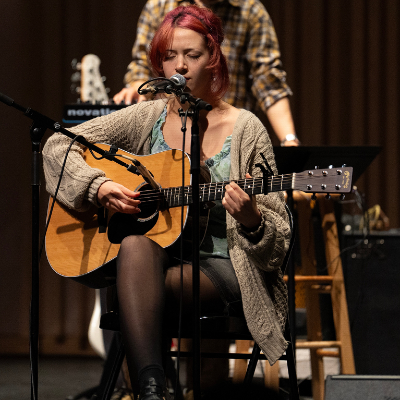Music Education for Children and Youth
The Community Music School (CMS) provides accessible music education to children and youth across the GTA. Founded in 1980 and based at Humber’s Lakeshore Campus, the school offers weekly private lessons and small-group classes for students of all musical experience levels.
For over 40 years, CMS has built an international reputation as a leader in jazz and children's music education, helping thousands of students develop their talent and pursue their musical aspirations.
CMS fosters a supportive and inclusive community by prioritizing the joy of making music and creating opportunities for students to celebrate their collective growth through performance. Our world-class coaches work with students step by step, helping them reach new levels in their musical development and build the confidence needed to achieve their individual performance goals.
Available Courses
 Summer Programs
Summer Programs
Perfect for young children who love music or are curious to explore it.
 Private Lessons
Private Lessons
 Children's Musicianship
Children's Musicianship
 Jazz Ensembles
Jazz Ensembles
Explore and develop small-group ensemble skills. Ages 12-18.
 Advanced Jazz
Advanced Jazz
Advanced improvisation, jazz vocabulary and ensemble playing.
 Group Lessons NEW
Group Lessons NEW
Registration for the Winter 2026 term is now open! Save your spot today!
The winter term will run January 17th 2026 to June 20th 2026.
20 weeks of classes (excluding holiday weekends: Feb 14, April 4 & May 16)
All classes will be held at Humber College Lakeshore Campus on Saturdays between 9:00 a.m. and 5:00 p.m.
If you are not a returning student, an audition/interview is required for placement in both the Latin Big Band and the Advanced Youth Ensembles. Please email Giuseppe.Schepis@humber.ca for details
For Community Music School inquiries please email: communitymusic@humber.ca
Meet our Team of Music Educators

Johnny Griffith
_David%20French.jpg)
David French

Serena Mancuso
Lorne Lofsky
What Students Are Saying
"Love Community Music! I’m happy to have learned a new skill set that I can now share with others."
"Great experience. Excellent class and music coach!"
"I have been in the Community Jazz program for 5 years. It’s always been an enjoyable and educational experience."
"From an early age, my son had a love for music, particularly jazz. We first learned about Humber when he was listening to Jazz FM and during a visit to the long-standing jazz venue, The Rex. After researching the Community Music program, my son auditioned and was fortunate to be accepted.
Though we live outside of Toronto, the drive to Humber on Saturdays is well worth it.
Additionally, our son has a disability, but Humber and everyone involved has created a warm and welcoming environment that has greatly contributed to his personal and musical development. We are incredibly grateful to have found Humber, as it offers an especially inclusive and supportive atmosphere. From the administration to the instructors and students, it truly is a unique place." - Tim H. & Elsa Q.
How Music Education Helps
Studies show that music education enhances children's cognitive and social development. It improves attention span, language and literacy, memory, sound processing, spatial reasoning, and speech perception. Music education also builds confidence and self-esteem while teaching valuable skills in communication, leadership, problem-solving, and teamwork.

How Music Education Helps:
Improved Cognitive Development: Attention span, Language and literacy, Memory, Sound processing, Spatial reasoning, Speech perception.
Improved Social Development: Communication, Confidence, Leadership, Problem solving, Self-Esteem, Teamwork.
![]()
“Music enhances the education of our children by helping them to make connections and broadening the depth with which they think and feel. If we are to hope for a society of culturally literate people, music must be a vital part of our children's education.”
- Yo-Yo Ma
![]()
“Music education opens doors that help children pass from school into the world around them – a world of work, culture, intellectual activity, and human involvement. The future of our nation depends on providing our children with a complete education that includes music.”
- Gerald Ford
![]()
“Adolescents with music training have better cognitive skills and school grades and are more conscientious, open and ambitious. These effects do not differ by socio-economic status… Music improves cognitive and non-cognitive skills {more than twice as much as sports, theatre or dance}."
- 2013 German Social Economic Panel (study)

